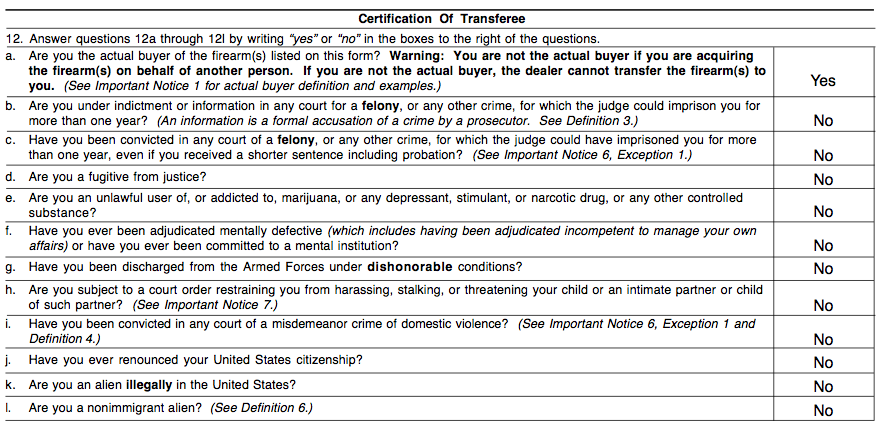In my post about the complaint in Lane v. Holder, I noted that one paragraph in the fact section focused exclusive on how the plaintiff was not dangerous:
7. Michelle Lane is over the age of 21, is not under indictment, has never beenconvicted of a felony or misdemeanor crime of domestic violence, is not a fugitive from justice,is not an unlawful user of or addicted to any controlled substance, has not been adjudicated amental defective or committed to a mental institution, has not been discharged from the ArmedForces under dishonorable conditions, has never renounced her citizenship, and has never been the subject of a restraining order relating to a child or an intimate partner. Ms. Lane holds a validUtah permit to carry a handgun, which is recognized in numerous states.
As I argue in The Constitutionality of Social Cost, these questions cut directly to the heart of what I view as undergirding all Second Amendment questions–will this firearm wind up in the hands of someone dangerous who can harm others. Ms. Lane’s history suggests that she is not such a person with a propensity for violence.
Commenter PT noted that these questions effectively spell out the answers to the Firearm Transactions Record, or Form 4473, a form that must be filled out before anyone purchases a firearm from a Federal Firearm License holder. Indeed, question 12 speaks directly to these elements.
- Are you under an indictment for a felony–whether violent or not? (For my thoughts of whether this restriction is constitutional post Heller, see here).
- Have you ever been convicted of a felony–whether violent or not?
- Are you a fugitive from justice?
- Are you an abuser of an illegal drug? Presumably, people who use drugs break other laws, and pose a risk of harm to others.
- Those adjudged mentally defective are among the people that Heller indicated received limited constitutional protections for the Second Amendment.
- People subject to a restraining order are certainly those that are at risk of harming others.
- Questions about violent misdemeanors was at issue in Skoien.
Some of these questions focus on dangerousness. Some do not. People convicted, or even indicted, for non-violent offenses, are in the same boat as those who commit violent felonies. For this reason, I suggest bifurcating second amendment challenges.
Second Amendment challenges should be bifurcated based on the social costs involved and the actor’s propensity for violence. For the deprivation of the liberty of persons lacking a propensity for violence, the burden of persuasion should remain with the state, and stricter judicial scrutiny is warranted. For those who have demonstrated a propensity for violence and who are likely to inflict harm in the future, such as violent felons, the burden should rest with the individual, and less exacting judicial scrutiny is appropriate.
The questions in this form are a weak proxy for ascertaining whether a person would be dangerous and pose harm to others if he or she obtained a firearm. These are the questions of the constitutionality of social cost.
Update: Tom Huff emailed me, and informed me that the statutory authority for these questions is 18 U.S.C. 922(g):
(g) It shall be unlawful for any person—
(1) who has been convicted in any court of, a crime punishable by imprisonment for a term exceeding one year;(3) who is an unlawful user of or addicted to any controlled substance (as defined in section 102 of the Controlled Substances Act (21 U.S.C. 802));(4) who has been adjudicated as a mental defective or who has been committed to a mental institution;(8) who is subject to a court order that—(A) was issued after a hearing of which such person received actual notice, and at which such person had an opportunity to participate;(B) restrains such person from harassing, stalking, or threatening an intimate partner of such person or child of such intimate partner or person, or engaging in other conduct that would place an intimate partner in reasonable fear of bodily injury to the partner or child; andto ship or transport in interstate or foreign commerce, or possess in or affecting commerce, any firearm or ammunition; or to receive any firearm or ammunition which has been shipped or transported in interstate or foreign commerce.
